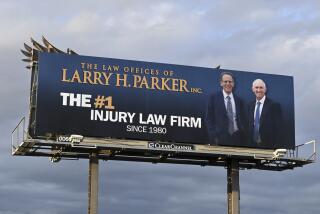Robert B. Parker dies at 77; best-selling author of ‘Spenser’ private-eye novels
Robert B. Parker, the best-selling author whose long-running “Spenser” private-eye novels updated the genre of hard-boiled detective fiction in the 1970s, has died. He was 77.
Parker died Monday of a heart attack at his home in Cambridge, Mass., said his longtime literary agent, Helen Brann.
“He was at his desk, working on a new book -- a new Spenser,” Brann said.
Once dubbed “the doyen of old-school, hard-boiled American pulp,” the former English professor at Northeastern University in Boston wrote 60 novels -- 37 of them featuring his tough but literate private eye, Spenser, who debuted in “The Godwulf Manuscript” in 1973.
“In the line of great American hard-boiled writers that went from Dashiell Hammett to Raymond Chandler to Ross Macdonald, Robert B. Parker is the next great one in that line,” said Otto Penzler, owner of the Mysterious Bookshop in New York City and a publisher of crime fiction.
Parker, he said, “had a spare style that made his books entertaining and readable consistently. His protagonist, Spenser, was a real hero, and I think people love heroes.”
Parker served as a consultant on the ABC series “Spenser: For Hire,” which ran from 1985 to ’88 and starred Robert Urich in the title role. (Parker’s involvement? “To cash the check every week,” he later told USA Today.) Spenser later resurfaced in a series of A&E TV movies starring Joe Mantegna.
The mustachioed Parker, who was known by his friends for being a funny man who loved to laugh, received an Edgar Allan Poe Award from the Mystery Writers of America in 1976 for his Spenser novel “Promised Land.” In 2002, he received the organization’s Grand Master Award.
“There was no shortage of praise for him,” said Christine Pepe, vice president and executive editor of G.P. Putnam’s Sons.
Pepe, who was Parker’s editor since he moved to Putnam’s in 1989, described Spenser as Parker’s “modern take on a hard-boiled detective.
“He liked to cook. He had an encyclopedic knowledge of literature and music. He had a very dry wit, as did his creator. And Spenser, like all these good characters, had a code of honor he lived by.
“Spenser was always completely sure of himself, and I think readers just loved to have someone that they can count on and loved to know that Spenser would always do the right things. And in a world where you can’t count on a lot of things, I think it matters more and more.”
As a writer, Pepe said, Parker “was a dream to work with. He helped me be better at my job because he was so good at what he did.”
Parker also wrote two other bestselling series for Putnam’s: the Jesse Stone crime series about a small-town police chief in Massachusetts; and the Boston-set Sunny Randall series about a female private eye.
Among his other novels is the western “Appaloosa,” which was turned into a 2008 movie.
Parker, who acknowledged that he was trying to replicate Chandler’s Philip Marlowe in his early Spenser novels, was asked by the Chandler estate in the late 1980s to complete an unfinished Philip Marlowe mystery for which Chandler had written only four chapters.
Parker jumped at the chance, and “Poodle Springs” was published in 1989. He also wrote “Perchance to Dream,” a 1991 sequel to Chandler’s 1939 classic “The Big Sleep.”
Parker was born Sept. 17, 1932, in Springfield, Mass., and later moved to New Bedford. He earned a bachelor’s degree in 1954 from Colby College in Waterville, Maine, where he began dating his wife, Joan, whom he married in 1956.
After serving in the Army in Korea from 1954 to ‘56, he earned a master’s degree (1957) and doctorate (1971) from Boston University. He had early jobs as a technical writer and in advertising before he began teaching college English.
He was teaching at Northeastern University in Boston when he began writing his first Spenser novel in the early ‘70s.
“You need lots of time to be a writer,” he told Massachusetts’ Telegram & Gazette in 1997. “I knew being a writer is what I wanted to do and set up my life to reach that goal.”
He is survived by his wife and two sons, David and Daniel.
“I would rather be her husband and their father than ‘Robert B. Parker,’ ” he told USA Today in 1989.
More to Read
Sign up for our Book Club newsletter
Get the latest news, events and more from the Los Angeles Times Book Club, and help us get L.A. reading and talking.
You may occasionally receive promotional content from the Los Angeles Times.









